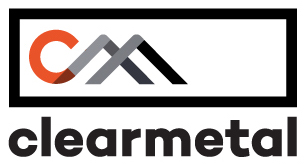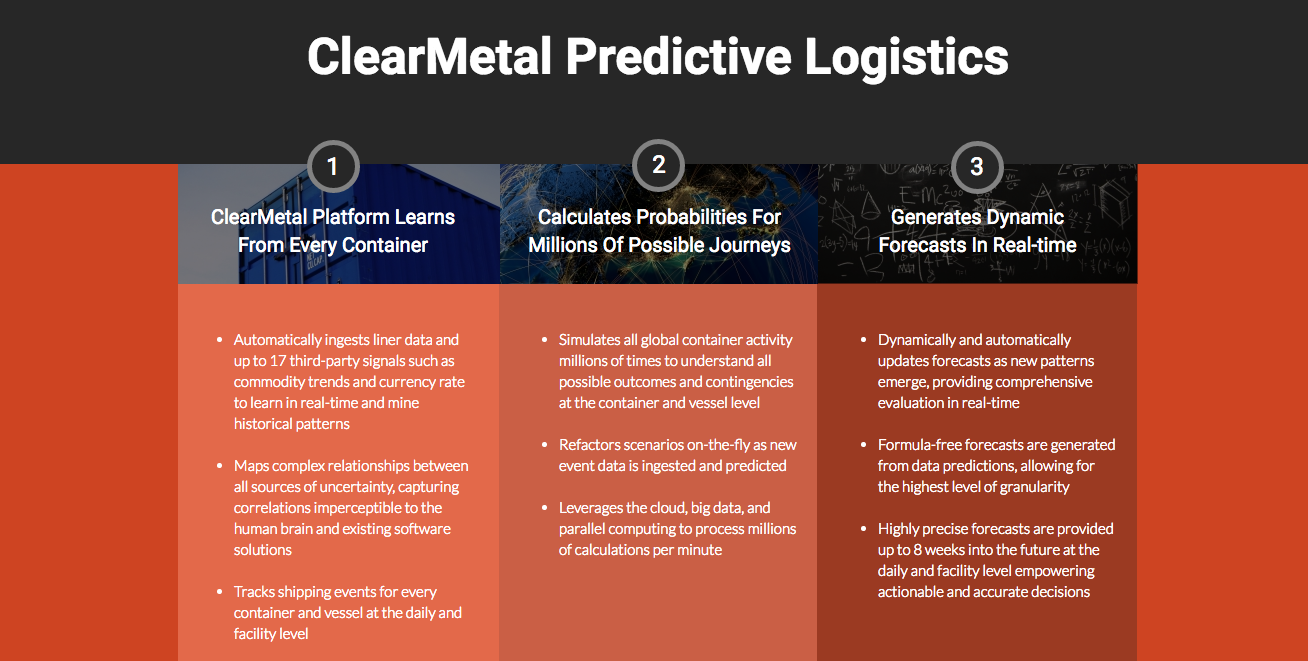This is part of a series on machine intelligence companies. We interviewed Beagle, Mariana, Beyond Verbal, Preteckt, Eigen Innovations, and Affectiva. Now we’re turning our attention to ClearMetal.
Most of us have no idea how the gadgets we use, the food we eat, and the products with which we surround ourselves make their way to us from their manufacturers.
Sure, we might be vaguely aware that there are great big boats and shipping containers involved, but that’s about the extent of our knowledge. Everything might as well make its way around the world via magic pixie dust.
Adam Compain knows that pixie dust isn’t involved in the shipping process. Instead it’s a complex juggling act involving so many ships, containers, ports, and businesses that it’s hard for the rest of us to even imagine the size of this infrastructure.
That’s why he co-founded a company called ClearMetal: To help shipping companies manage the chaos that thrives between points A and B.
We spoke with Adam to learn more about ClearMetal’s technology, especially how it uses machine learning and artificial intelligence to predict what will happen as products make their way to us.
[Editor’s note: The interview questions and responses below have been edited for clarity and length.]
What’s your role at ClearMetal and what does that entail?
I’m a founder and CEO, so I’m doing a little bit of everything.
But generally what I’m spending my time on these days is broadly ensuring that our company is focused, moving in the right direction, and has the resources to execute on its vision.
What did you do before you founded ClearMetal?
I founded ClearMetal while I was at Stanford and working with a large Chinese shipping company. Before that I was at Google.
I’ve had a really long-running curiosity with shipping logistics, stretching back to when I was a little kid. That curiosity led me to working for a large shipping company in Asia while getting my MBA.
The problem I discovered was essentially that there was so much complexity and obscurity in operations for the logistics industry, and these carriers tell us that the technology they are able to get their hands on is pretty insufficient.
What’s the most challenging aspect of your role?
Honestly I think the hardest part is doing what our company is doing, which is bridging the gap between Silicon Valley technology and shipping and logistics operations.
Every day, I spend a lot of time speaking with customers and people in the industry and having to 1) educate them about what does this technology do? and 2) explain how this technology can empower what they do on a daily basis.
It’s a lot about evangelizing the technology and educating about precisely how we can help our customers.
And it’s really hard because what we’re doing is pretty disruptive — and I hate that buzzword — but it’s a very new, cutting-edge technology for an industry that typically doesn’t live with this technology.
What does ClearMetal do?
What we do at our core is what we call predictive logistics. That’s essentially using the most sophisticated technology available to solve the most complex operational problems in shipping and logistics.
To be a little more specific, the problem that we’re solving is that shipping carriers, as well as other companies in the supply chain — ports and terminals, the brokers in the industry, the rail and trucking companies — basically all of these companies have to deal with overwhelming complexity and uncertainty.
To ship a container all the way from Shenzhen to Chicago, for example, there are a lot of things that can happen along that chain.
There’s a lot of uncertainty around customer behavior, cancellations, and stuff like that. There’s also a lot of uncertainty around the market: Will commodity prices change? Will there be broader changes in cost?
And then there’s the problem of operations. When the ship arrives in port, will there be congestion? Will there be a delay? They have to worry about all of these problems.
Basically they have all this complexity on one side, and because the tools they’re using don’t have the sophistication to predict this crazy uncertainty on the shipping cycle, they’re left with a lot of unnecessary costs and complexity.
In basic terms, how does ClearMetal’s platform work?
What we’re doing is we’re using the most sophisticated technologies, like machine learning, to predict and forecast with much higher accuracy and granularity.
We say, let’s look at every single element in this cycle. Let’s look at every booking, every behavior, every operational contingency. Let’s figure out all the data under the surface.
Let’s predict what might happen, run millions of AI simulations to figure out precisely what will happen, and then with every new thing that happens, let’s use our technology to update those predictions in real-time.
It’s a much more powerful technology and a more granular approach.
Basically, ClearMetal is resolving uncertainty and providing clarity to allow these companies to be more efficient. We figure out how to make sure they aren’t left high and dry.
What can we expect from ClearMetal in the future?
We’re a predictive logistics company, and our core competency is on highly accurate and granular predictions.
Where we’re starting right now is this container management problem for container shipping. But what you can expect from us in the future is using artificial intelligence and predictions to empower the operations of companies throughout the shipping and logistics landscape.
Look out a couple of years, what’s ClearMetal doing? Enabling the players in logistics to be the most sophisticated.
Our core mission is making global trade more efficient by the use of this technology.

What’s the most exciting trend in machine learning from ClearMetal’s perspective?
I think the most exciting trend is the increasing interest in and tolerance of this technology from mature industries. Eric Schmidt talks a lot about how artificial intelligence will totally transform every industry.
So to us the most exciting trend is not necessarily on the technology front. Instead it’s more on the readiness of the world to adopt and implement these kinds of things.
What advances in machine learning have benefitted ClearMetal the most?
One thing that’s for sure is the industry technology infrastructure, at least in logistics, has matured to the point that you can apply this type of technology. The data is now there, it’s retrievable, and in these industries like logistics, it’s now being tracked and housed properly (with a grain of salt).
Of course, we’re seeing the decreasing costs of extremely powerful computing, which has helped quite a bit. We’re also seeing some interesting front-end libraries that we’re noticing allow companies to make quicker use of data and machine learning predictions.
For this particular shipping problem, we’ve created what we consider a proprietary pipeline of how we’re using particular machine learning models, and we’ve noticed other companies getting creative with their implementations of different tools, as well.

Does ClearMetal consider itself a machine learning company?
I would probably position us as an artificial intelligence company. But yeah, we are a data science and machine learning company.
The reason for that is because 1) everything we do is from that approach, and 2) our core and how we solve problems is through predictive logistics, and the ability to power that prediction comes from machine learning and other technologies.
Unlike other companies that have a lot of data and use machine learning to gain insights and do cool things, our core product and how we solve this problem is on a platform built entirely on machine learning technologies.
Do you have any serious competition in this space?
We do have a lot of large and very mature technology companies offering solutions to shipping carriers, for example, and they’re talking all about big data and advanced analytics and these sorts of things. And they’re even talking about machine learning.
But what we haven’t seen is anyone with the amount of focus and sophistication with machine learning to solve this problem. For us, it’s the proprietary application of machine learning technology to the problem we’re solving.
We haven’t seen anyone as focused as we are or as experienced as we are on solving this issue.
To the layman audience, I think we may be indistinguishable. But the reality is that, if you really understand the technology or the problem, you get that you need a deep specialist like us to do this, not a generalist that is simply looking for ways to apply their machine learning technology.
Another team of AI experts couldn’t really come into our space and do what we’re doing with the success with which we’re doing it because it requires such a nuanced understanding of the shipping industry and everything that goes into it.
You have to have a lot of knowledge about how what’s happening in the real world to apply this technology properly.
This post is part of a series of interviews with machine intelligence companies that are harnessing the power of machine learning and artificial intelligence in innovative ways. Stay tuned for more!


